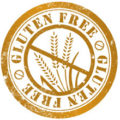Is there a link between mental health issues and nutrition?
 It seems that there is, at least in some cases, and links have been made between gluten – which is of course my main interest here – and:
It seems that there is, at least in some cases, and links have been made between gluten – which is of course my main interest here – and:
- ‘brain fog’
- anxiety
- depression
- dementia
- autism
- and schizophrenia
Many people have reported ‘brain fog’ and anxiety as symptomatic of gluten poisoning, and depression is a classic symptom of coeliac disease. The Mayo Clinic believes that coeliacs are at increased risk of dementia, and Michael Gardner, Professor Emeritus at Bradford University is researching the theory that diet is involved with autism and schizophrenia.
Today, though, I want to look at depression, and will come back to schizophrenia and autism another time.
We know that depression is present in a higher percentage of people with coeliac disease than in the normal population, based on Italian studies in 2003 (and others).
You might ask: which came first? Are people depressed as a result of their diagnosis, or is the disease the cause of the depression?
The answer seems to be both.
Eating gluten can cause depression
Eating gluten if you are a coeliac (diagnosed or not) seems to have an impact not only on your physical health, but also on your mental health. There may be two reasons for this:
- malabsorption
coeliacs eating gluten fail to absorb tryptophan, which leads to a decrease in production of serotonin (the ‘feel-good’ brain chemical), and increasing the risk of mood disorder. Coeliacs eating gluten are also likely to be short on other vitamins as a result of their malnutrition, such as vitamin B6, vitamin C, folic acid and zinc, all of which are needed to help make serotonin from tryptophan.
- the immune response
cytokines are produced that may change the body’s ability to regulate mood
Cytokines, signaling molecules of the immune system, have been implicated as a contributing factor for mood disorders such as depression (from Biopsychiatry 2003).
Maes and Smith (Perspectives in Depression 1999) have proposed excessive cytokine secretion due to chronic immune system activation as a fundamental pathology underlying depressive symptoms. Cytokines as such cannot cross the blood-brain barrier, but growing evidence suggests that specific cytokines may signal the brain to produce neurochemical, neuroendocrine, neuroimmune, and behavioral changes.(Kronfol and Remick, Am J Psychiatry 2000). Cytokine activation is known to enhance the hypothalamus-pituitary-adrenal axis hyperactivity associated with major depression. (Maes and Smith Psychomeuroendocrinology 1995). … Any such mechanism could be operative in untreated CD and could cause disturbances in brain serotonin function, predisposing the patient to mood and behavioral disorders. (from Psychosomatics 2002)
Being diagnosed can cause depression
And of course having a lifelong condition that requires a lifestyle change is highly likely to trigger depression – whether the condition is coeliac disease or some other significant disorder.
The Royal College of Psychiatrists has a section on physical illness and depression, as a subset of its depression pages.
So what can we do?
The easy answer is, of course, to avoid gluten, though as we all know, this isn’t that easy.
Once you’ve eliminated gluten from your diet, then your nutrition should improve. Eating a healthy diet – not junk food that happens to be gluten free – will help. Gluten free sources of the elements mentioned above include:
- meat, fish, beans and lentils for tryptophan
- avocados, bananas, raisins, currants and sultanas, sunflower seeds and soya for vitamin B6
- a wide range of fruit and vegetables for vitamin C
- leafy green vegetables, avocados, oranges, almonds and walnuts for folic acid
- and zinc can be found in peanuts, cheese, figs, nuts and seeds, and small amounts in green and yellow fruit and vegetables
Eat all of that lot, and you ought to be producing some serotonin, and feeling a lot better. Plus, of course, removing gluten from your diet will also remove the immune reaction.
But what about depression caused by the discovery of the condition, rather than the condition itself?
If you think (or those around you think) that you may be depressed, you should seek treatment. This isn’t something you can just ‘snap out of’. Do go and see your doctor.
Also, researchers have found that psychological support can help coeliacs with anxiety and depression stick to the gluten free diet – so if you are struggling with the diet, ask for professional help. There are also supportive amateur communities around who can offer advice – try the gluten free messageboard – but this isn’t a substitute for treatment.
Further reading:
Food and Behaviour Research and Food and Mood have interesting and valuable information about the relationship between nutrition and health.
If you need more information about dealing with mental health issues, visit the NHS section on mental health at National Library for Health and the Royal College of Psychiatrists section on mental health information.
Kathy at Gluten Free Kathy is researching the psychology of celiac disease, and is compiling a list of useful links.
 |
I’ve written a book summarising what we’ve learnt over 20 years of dealing with the gluten free diet, and it might be just what you’re looking for. It packs the lessons we’ve learned into what I hope is a helpful and straightforward guidebook. It’s available on Amazon, as a paperback or for your Kindle… |






This is an excellent article about the impact of celiac disease on our mental health.
You might want to read a book called, The Second Brain by Dr. Michael Gershon. It is available from Amazon.co.uk. It is a technical book about how the gut works, medical history, psychology and how the functioning of the gut impacts our brain function. My doctor had me read this when I was first diagnosed with gluten sensitivity.
Sheltie Girl @ Gluten A Go Go
Hi Sheltie Girl – thanks for the pointer to the Second Brain book. I’ve added it to my Amazon basket (waiting to score free delivery …)
Are you over on the MomGadget forum? This is Angela.. can you let me know what your alias is over there? As a Gack Ink member I need to do something for you. My screen name is “angela” over there. Shoot me a PM, will ya?
I have suffered from depression for over 18 years now. However once I was diagnosed I have noticed that my depression is not as severe and when I go get glutenized that is one of the first symptoms that I experience. I wish doctors would test people more often for Celiac. Thanks for the post.
Actually zinc is not a vitamin, it’s a mineral. Sorry, don’t mean to sound nit-picky. If you’re going to list nutrients that malabsorption affects, you could have a very long list but a specific mental health nutrient which has been ”druggized” is lithium. The natural mineral lithium plays a huge role in mental health and the pharmaceutical kind is quirky and has been tampered with a bit and is used improperly but one should consider looking into a non-”drug” lithium when confronted with mental illness and it -like nutrients in general- has a good chance of being malabsorbed with celiac’s disease and any disease or syndrome which inhibits intestinal absorption. Also many who have no ”disease” to diagnose that would cause malabsorption find that they are allergic to many foods that cause similar types of damage to their intestines as celiac’s but the damage is possibly very slow and can happen over many, many years and you may never actually find out. Simple pulse testing could be employed for free if you put in the time and effort. Mental health is often physical in origin rather than complex psychological issues in need of a therapist. It’s a shame people don’t realize it more often. Even low blood cholesterol can cause depression. Now if we got REALLY smart in the world we could connect the dots between malabsorption and cancer and diabetes because they can be linked in an awful lot of cases too.
PS: It’s okay, you don’t HAVE to give up on bread if gluten’s your trouble, there are gluten free breads out there as well as gluten free pastas and crackers and all kinds of starchy goodness. It wouldn’t be the end of the world to give up the wheat and other grains containing gluten. It might be the beginning of your health though.
Hi Lea – I’m sorry to hear about your depression symptoms, but its good to know that diagnosis helped. I absolutely agree with you that testing for CD should be done more often – there are far too many people still struggling with symptoms that could be eased if only they knew what would help.
JD Shafer – thanks for visiting. You’re quite right, zinc is a mineral, and I should have picked that up before posting! Very interesting about lithium, I hadn’t heard about that before, so thanks for telling us about that.
This is an excellent website and subject I haven’t seen around much. We all need to be more conscious of what we are putting in our bodies. Thanks for the info.
This makes massive sense based on personal experience. Had a lot of stress for couple of years, loaded up on carbs, felt like crap, finally body revolted and had stomach probs, decided gluten was the prob. 2 weeks later I feel 100% better physically and emotionally, like night and day. That food list is about what I eat. The cool thing about no gluten is that it forces to avoid junk food. I now only eat good food. Pictures of a baguette bring some nostalgia but thats about it.
Hi happyglutenfree! Glad to hear you’re feeling so much better these days. I think you’re right about the junk food, though we still enjoy things like chocolate here …
Inspiring article. Dr Rodney Ford, a world authority on gluten and allergies, has written books about gluten and its links to depression, other mental health problems and many other health conditions. You might find these good references as well, if you haven’t already seen them.
Thanks for the recommendation, Nyomi!
I am so glad I stumbled across this post! I started gluten free 21 days ago and noticed immediately that I was happier and had a brighter outlook. I have been on antidepressants for 10 years to control depression and have been surprised to reach the end of several days happy without taking my meds. I am now weaning off the antidepressants as I don’t seem to need them any longer. Thank you for the concrete info to reinforce my suspicions!
Glad to help Andrea – and very pleased to hear that you’re feeling happier these days.
Hi,
My Sister has celiacs and we are finding out that many of our family members have gluten allergies. All of this makes perfect sense.
My niece was so taken by her mom’s disease that she started a Gluten Free bakery and is doing really well.
Check it out!
http://www.migletsgf.com